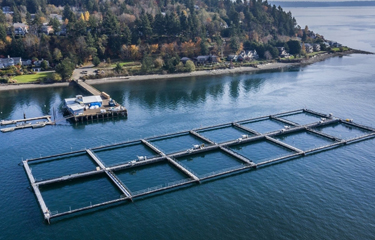Cooke Aquaculture has received a key permit from the U.S. state of Washington that will allow it to stock its Hope Island farm with rainbow trout.
The permit, issued by the Washington Department of Fish and Wildlife on 5 August, will allow Cooke to stock its Hope Island farm, in Puget Sound’s Skagit Bay, with 365,000 steelhead, also known as rainbow trout. But the facility’s lease expires in March 2022, before the fish will be ready for harvest, meaning the company must either obtain an extension on its lease or move the fish to another site by that time.
“The WDFW permit is valid and in place. WDFW conducted an extensive analysis of potential risks associated with farming sterile, all-female rainbow trout. That analysis took a year and included consultation with scientists, tribes, and public comment. The permit was challenged and upheld in its entirety by [Washington’s] Superior Court, and allows for farming of rainbow trout. The fish are grown from local stocks, using the same egg source WDFW uses for stocking lakes and rivers in Washington,” Cooke Vice President of Public Relations Joel Richardson said. “Cooke has worked with DNR, WDFW, and the Washington Department of Ecology – which after significant public consultation and scientific review, revised our four water quality permits to allow steelhead to be raised by strengthening regulations in the permits to ensure water quality is protected.”
Blacks Harbour, New Brunswick, Canada-based Cooke previously obtained water-quality permits for its farms from the Washington Department of Ecology in January 2021 and received approval from the Washington Department of Fish and Wildlife to switch from farming Atlantic salmon to steelhead in January 2020, following the state’s decision to ban the aquatic farming of non-native species. That move came after a 2017 net-pen collapse at Cooke’s Cypress Island site resulted in the escape of at approximately 500,000 Atlantic salmon. In 2019, the company settled a lawsuit filed by Wild Fish Conservancy, arguing Clean Water Act violations, for USD 2.75 million (EUR 2.3 million).
Cooke still faces a lawsuit from the Wild Fish Conservancy, the Center for Food Safety, the Center for Biological Diversity, and Friends of the Earth challenging the permits granted by the state to Cooke for stocking steelhead, which is scheduled to be heard by the Supreme Court of Washington in September. The groups claim that fish farms of the size Cooke operates in Washington can degrade water quality, introduce disease to native fish populations, and threaten wild animals such as killer whales.
“We feel blindsided by this fast-moving process, which could cause major environmental damage,” said Sophia Ressler, Washington wildlife attorney at the Center for Biological Diversity. “The stocking of this facility has the potential to contaminate our waters and threaten the species that are so dear to our Puget Sound ecosystem.”
Wild Fish Conservancy Co-founder Kurt Beardslee argued Washington should not have granted any further permits while a challenge that could invalidate Cooke’s ability to operate its net-pen farms is pending.
“Right now, Washington’s highest court is deciding whether Cooke Aquaculture’s new project should have ever been approved. Before the end of the year, the court could invalidate every permit granted to Cooke and require the comprehensive environmental review demanded by Tribal Nations, elected officials, and thousands of members of the public,” Beardslee said. “This decision to approve the transport of fish into Puget Sound net-pens while the court's decision is pending is fundamentally reckless and further demonstrates an alarming pattern of state agencies putting the wishes of a billion-dollar industry ahead of wild salmon recovery, tribal treaty rights, and the public’s best interest.”
Cooke’s Richardson called the groups’ claims “misleading” and “outrageous.”
“One of the parties making this release, the Wild Fish Conservancy, is a party to a settlement with Cooke. Cooke is required to, and did in fact provide, all of the engineering analyses for the Hope Island facility to WFC,” Richardson said. “WFC did not provide comments or raise any concerns regarding that engineering analysis, and the state agencies that have reviewed that third-party certification likewise have no concerns about the safety of the Hope Island facility.”
Photo courtesy of Center for Biological Diversity







